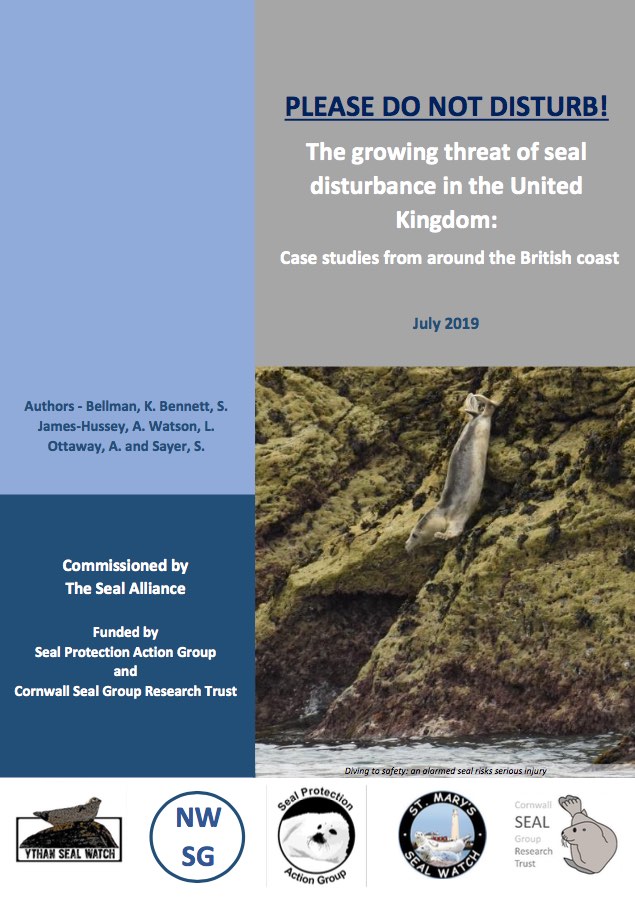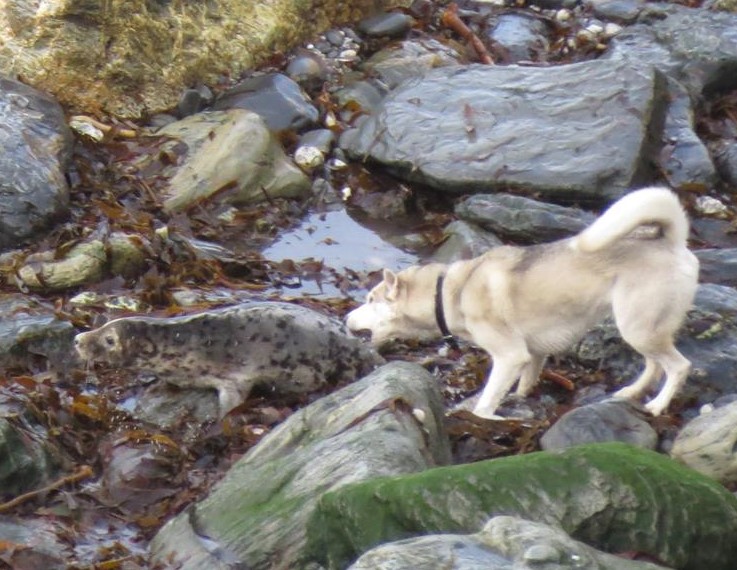For local residents and the many visitors to The Lizard, the chance to see our seals swimming and diving, or hauled out on the rocks is one of the many wildlife delights. Seals are however very vulnerable to disturbance – you should always give them space and observe from a distance – use binoculars if you can – and keep dogs on a leash when you spot seals.
The dangers are highlighted in a new report released in July – ‘Please Do Not Disturb! – The Growing Threat of Seal Disturbance in the United Kingdom’ – which sets out the growing and harmful impact that human activity is having on our globally rare and important seal populations. Funded by the Seal Protection Action Group (SPAG) and the Cornwall Seal Group Research Trust (CSGRT) for The Seal Alliance, the report documents case studies around the British coast – including here in Cornwall – where our protected seal populations are suffering chronic disturbances from human activities, often causing serious injury and with potentially fatal consequences.

Link to the report https://www.cornwallsealgroup.co.uk/wp-content/uploads/2019/07/2019-07-DO-NOT-DISTURB-public-report-for-release.pdf]
As the summer holidays begin, millions of British and international visitors flock to popular coastal destinations around the British Isles. The increasing popularity of ‘staycations’ and higher numbers of visitors from overseas, crowding around our coasts adds huge pressure onto our wildlife, especially seals. The South West of England, including Cornwall and our own Lizard peninsula, is a key area that these beautiful and intelligent marine mammals use for resting, socialising, breeding and moulting.
The researchers found compelling evidence that our seal population is suffering chronic disturbance issues from human intrusion through recreational activities as well as expanding tourism.
These disturbances, which can be either accidental or deliberate, come from motorised vessels, divers, jet-skis, kayaks, paddle-boarders, wildlife watching tours on land or sea, anglers, walkers, dogs on and off leashes, drones, light aircraft, helicopters and even commercial wildlife photographers. People trying to feed seals is also of growing concern.

In Cornwall: an off-leash dog biting the slowest young seal escaping to the sea (Image from CSGRT).
‘Our seals are under increasing threat from deliberate killing, climate change, over-fishing, toxic pollution, entanglement in nets, ingestion of plastic and serious injury from collisions with vessels’ said Andy Ottaway of SPAG, “We need to give all our precious marine wildlife, including seals, more space. The cumulative impact of all these threats, along with these growing disturbance issues, is placing these wonderful animals at serious risk’
The report warns that repeated disturbance can do serious harm to individual animals, through stress and even serious injury while fleeing human presence or from attacks by dogs. Disturbance can also impact at a local and national population level by reducing breeding success, abandonment of dependent pups and even premature death.

Tombstoning pregnant female, with caption: A group of seals in Cornwall being disturbed leads to a pregnant female dropping dangerously (tombstoning) from height into the sea (Image from CSGRT
The campaigners want to see more protection of essential habitats for seals through the expansion and enforcement of effective voluntary Codes of Conduct at a local level. Changes to national legislation are needed to regulate the growing wildlife watching tourism industry and ensure it is conducted both responsibly and sustainably, following ‘best practice’. The Seal Alliance have written to Secretary of State for the Environment Michael Gove, asking for a meeting with Defra officials to discuss how this might be best achieved.
‘Many communities benefit financially from tourism and the kind of reliable wildlife watching that seals provide. However, we need to take care and must reduce already high levels of disturbance, and soon, or those environmental, social and economic benefits could soon disappear along with our seals’ said Sue Sayer of the CSGRT.
Published: Aug 2019
Author: Find out more about seals in Cornwall on the CSGRT website [hyperlink to https://www.cornwallsealgroup.co.uk]
